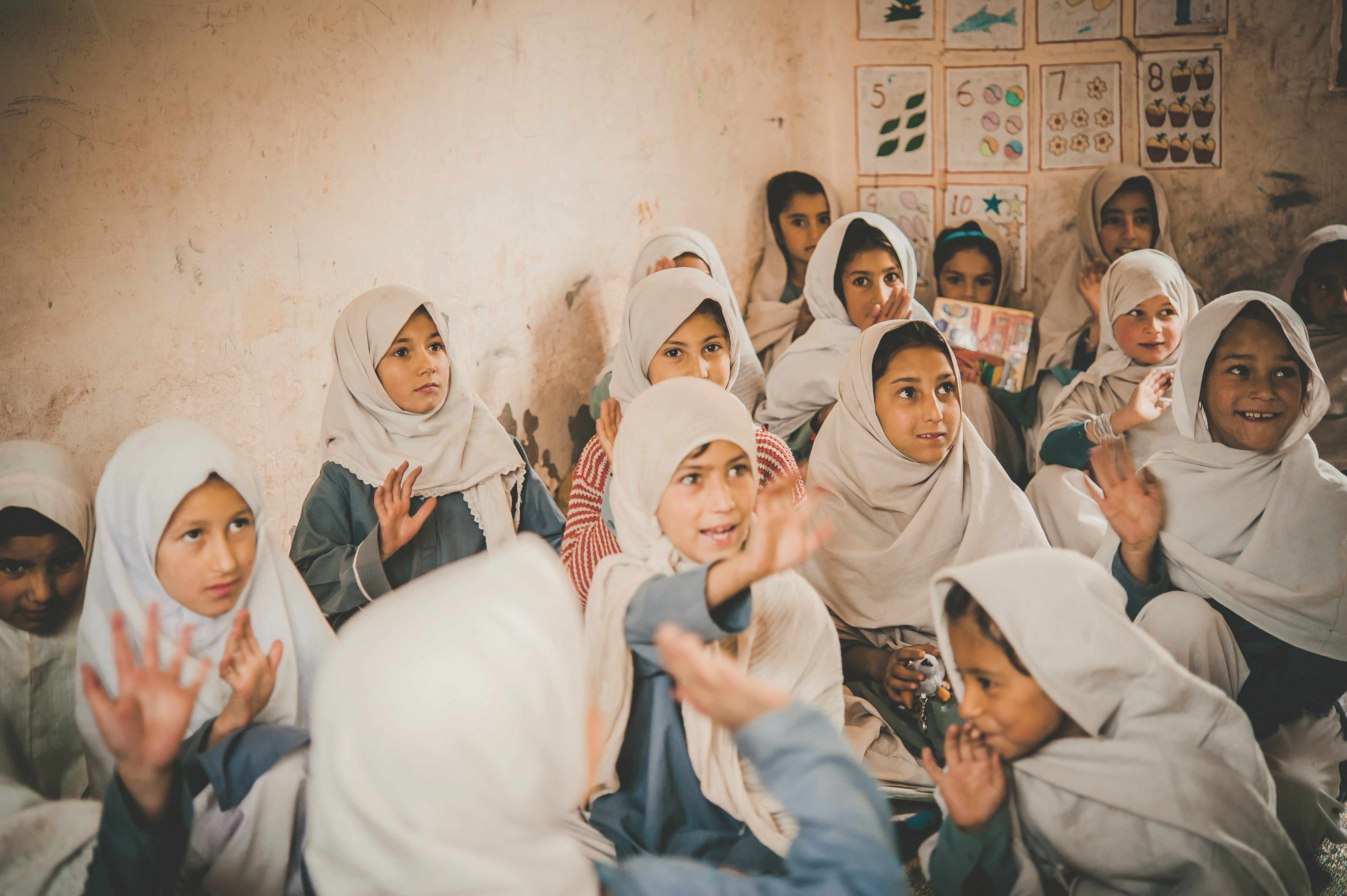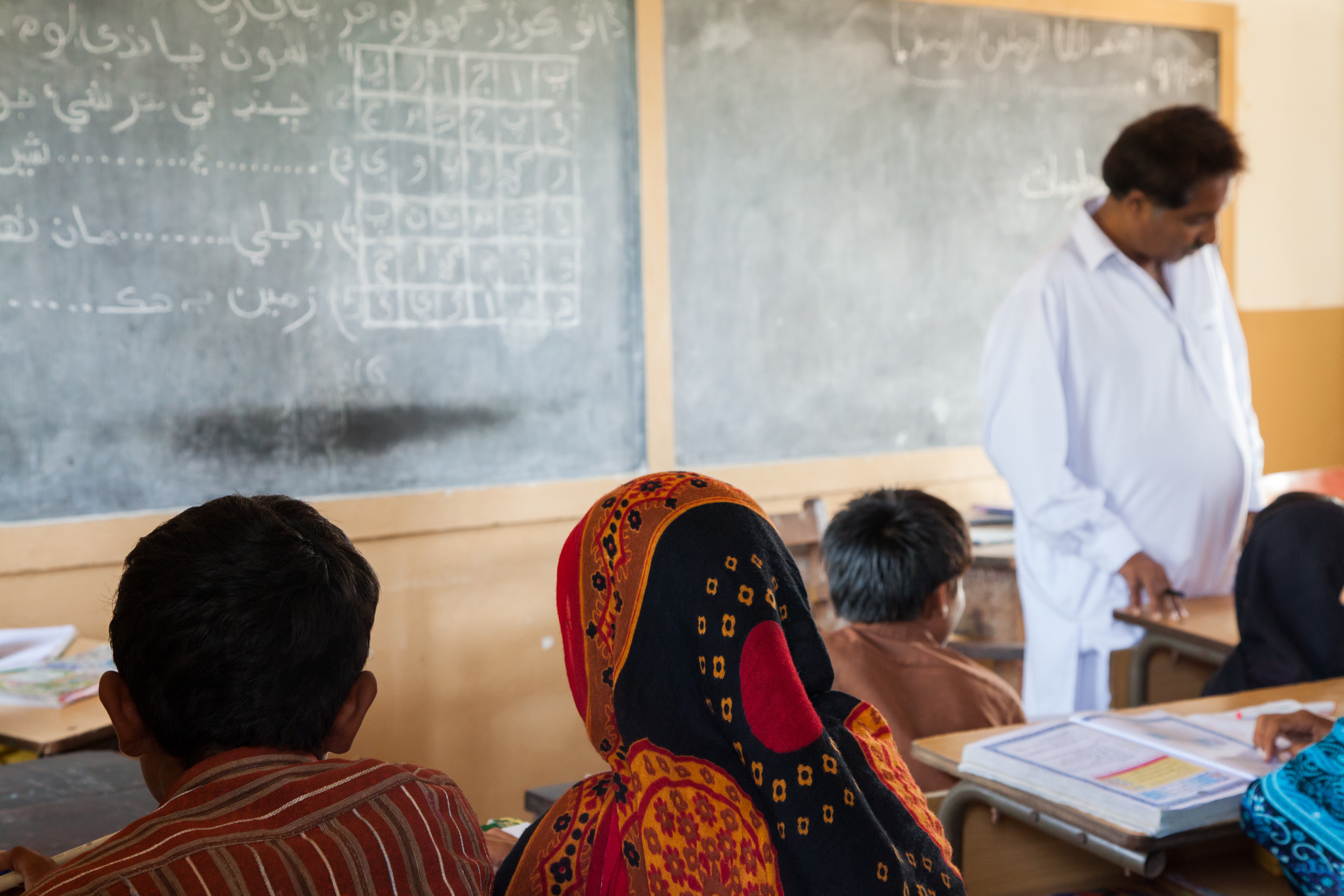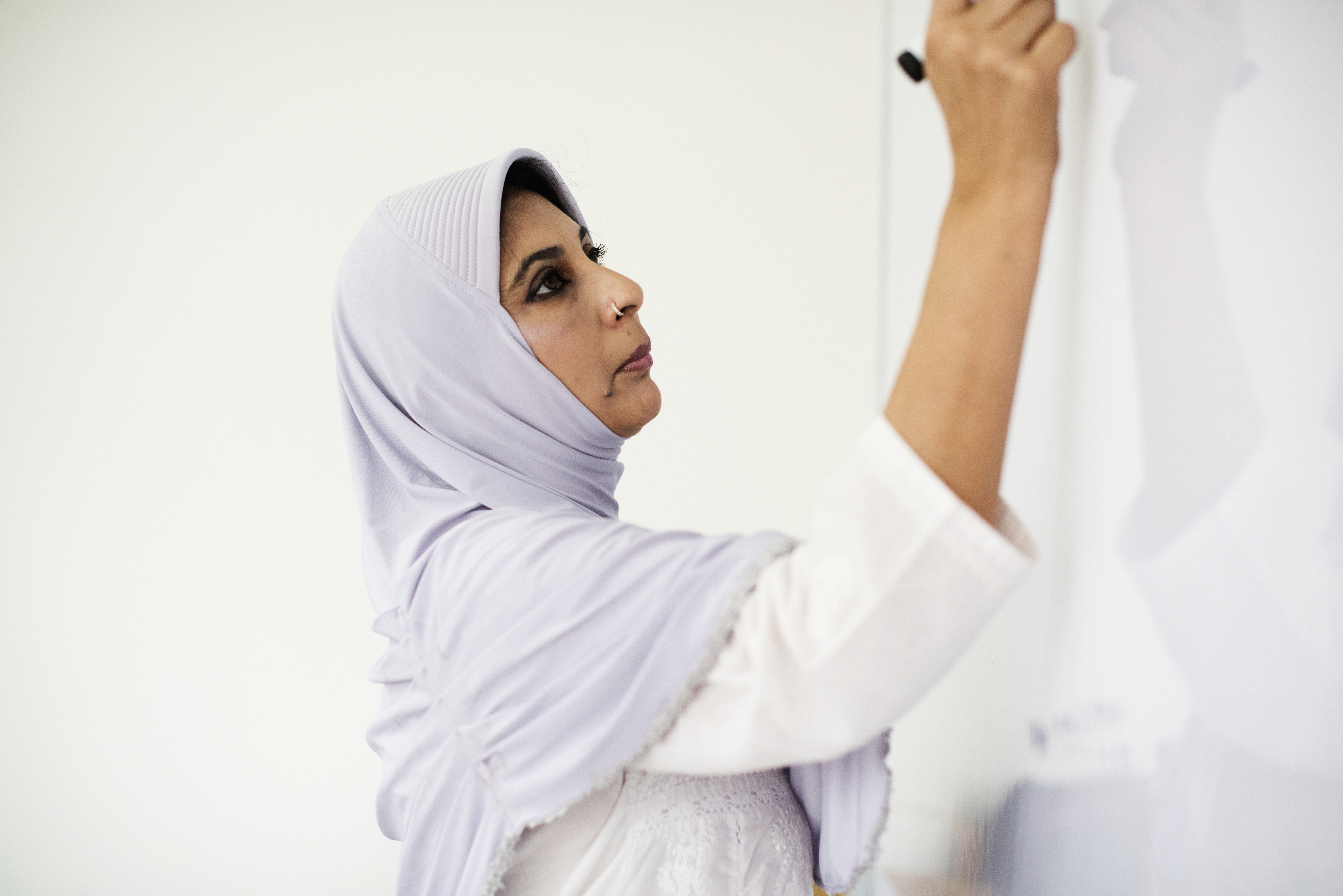Empowering Girls through Education in Pakistan

Opportunity EduFinance’s partners in Pakistan have a wide range of expertise and varied approaches to their work. And yet, a recent interview with several Pakistan financial institutions and stakeholders in the education sector found all were motivated by very similar understandings of the limitations in enhancing access to education across Pakistan – especially for girls.
To better appreciate these motivations and develop a deeper understanding of possible solutions to address barriers to girls education, we ‘virtually’ sat down with several Pakistani institutions to learn more.
In your view, what are the biggest barriers to girls' education in Pakistan?
AYESHA SALMA KARIAPPER, Group Head Quality Assurrance, Research and Design, Pakistan Poverty Alleviation Fund (PPAF)
In Pakistan, an estimated 22.5 million children are out of school, of which the majority are girls. Thirty-two percent (32%) of primary school age girls are out of school, compared with 21% of boys. This gender gap differential persists into middle school, and by grade nine merely 13% of young women are still enrolled in school.
The insufficient supply of middle and high schools within accessible distance is a major barrier for girls in rural areas. Similarly, the lack of adequate sanitation facilities particularly impacts girls’ retention rates in middle and high schools. Girls from poor communities living in remote, rural areas are especially vulnerable.
ROSHANEH ZAFAR, Founder/Managing Director, Kashf Foundation
The perceptions that investing in girls’ education does not result in the economic uplift of families deters parents from sending girls to school. When families violate these norms, they can face extreme pressure and hostility from their community and often discontinue their girls’ education when they hit puberty due to fear of harassment, social stigmas and disapproval.
There is a high need for quality education financing for schools. Global funders and local investors need to actively play a role in making resources available to build middle and higher secondary schools, at public as well as private sector level. Girls’ education should be incentivized by subsidizing school fees or by providing stipends at every level. Awareness of the importance of educating women and girls and the impact it has on family needs to be raised.

DR. SUGHRA CHOUDRY, Senior Advisor Education/ECD & HUMAIRA NASEER, Program Manager Education, Aga Khan Foundation (AKF)
Poor economic conditions of families result in their inability to cover the hidden costs of schooling and forces many girls to help with income-generating or household chores. Low incomes and consistently negative cash flows affects the ability of parents to pay school fees and provide continuous support to girls while in school. There is also limited access to vulnerable populations such as nomadic communities, internally displaced communities, and children with disabilities. There are extreme regional inequalities, and the gap between the relatively rich and the poor regions appears to be growing. COVID-19 has exacerbated the situation with a great demand on girls at home, endangering a return to school.
KASHIF MIRZA, President, All Pakistan Private Schools Federation (APPSF)
Some families do not believe that girls should be educated or they believe girls should not study beyond a certain age. Attitudes regarding girls’ education vary significantly across different communities. Many people, however, describe growing acceptance of the value of girls’ education, even in conservative communities; the government should encourage this change.
For many parents, the most fundamental barrier to sending their children to school is poverty. Children—usually girls—are kept home to do housework in the family home or are employed as domestic workers. Poverty also results in early marriages of girls: in Pakistan, 21% of girls marry before age 18, and 3% marry before age 15.
GHAZANFAR AZZAM, CEO, Mobilink Microfinance Bank Limited (MMBL)
Pakistan ranks 153 out of 156 in the Global Gender Gap Report and according to UN Women, 53.6% of women are deprived of education, training, and employment in Pakistan, compared to only 7.4% of men. Dismal as reports may look, it is a wake-up call for us as a nation to take strident steps towards improving the fortunes of our female population and empower them to become equal contributors in the economic progress of our country.
One of the main challenges currently befalling the education sector in Pakistan is the lack of funding. Financial institutions should do their part by developing tailored lending products for schools that would allow them to undertake much-needed improvements, hire and train staff, adopt digitized learning methods, and enable them to survive financial crunches safely.
SAQIB SIDDIQUI, Head of Sector Development, & MUHAMMAD FAHEEM KHALID, Manager Sector Development, Pakistan Microfinance Investment Company (PMIC)
There are many reasons because of which girl’s access to education gets adversely impacted, including poverty and cultural barriers. Sexual harassment is also a fundamental issue faced by girls while going to and from school. Due to this a lot of girls do not want to continue their education and drop out. In order to counter this issue, safe and secure transport should be arranged for girls by school management and school leaders need to invest heavily in the safety and security of their premises.
What is your organization doing that may address access and the gender disparities in education?
ROSHANEH ZAFAR, Founder/Managing Director, Kashf Foundation
To ensure and improve female enrolment in schools, Kashf’s school improvement loans are only disbursed to schools with minimum 40% female student ratio, with a promise to increase with each subsequent loan year. Kashf’s policy is to disburse 50% school improvement loans to female school owners who are seen to be more passionate about improving the situation for girls’ education in the country.
Kashf Foundation has conducted interactive sessions with teachers and school owners that are part of the Kashf School Sarmaya program to create awareness of child sexual abuse. This includes: how to tackle and identify problems associated with it, training teachers on the concept of strangers, physical and emotional abuse, negligence on the part of family members, and providing an implementation plan for a safe school environment, with aims to develop an understanding relationship between the student and teacher.
AYESHA SALMA KARIAPPER, Group Head Quality Assurrance, Research and Design, PPAF
To counter these challenges, in 2016, PPAF established girls’ schools in the under-resourced districts of Killa Abdullah, UC Zharaband, and Baluchistan. Since these villages did not have any schools before PPAF’s initiative, the biggest challenge in opening schools was the limited availability of local teachers. After motivating and consulting with communities, a few local male and female teachers were recruited in three newly established schools and within two months 50 girls were enrolled in these schools.
To further combat the problem of accessibility to education for girls in rural areas, PPAF initiated the Chamalang Education Programme, Baluchistan. Under the programme, 3,000 children of coal miners were admitted to private schools in Kohlu, Loralai and Quetta. As a result, between 2010 and 2020, these schools metamorphosed from crumbling facilities with 200 children, to schools bustling with 2,000 children who would use laboratories, libraries and activity rooms managed by a qualified team of school-based supervisors.
Now over 120 students have completed grade 10, and thus creating possibilities for a brighter future. There was also a transformation in the behaviour of parents and children. Not only did the parents willingly send their daughters to school, they also considered them as assets rather than burdens.

GHAZANFAR AZZAM, CEO, MMBL
In January 2021, MMBL partnered with Opportunity International Edufinance to increase access to education through school financing that links all Pakistani non-state schools to affordable capital. The product was designed for school owners with financing options to build new classrooms and infrastructure, source necessary ICT and safety equipment, and actively invest in improving the quality of education and learning environments. In a country where only 21% of the population is financially included and poverty is rampant, enhancing access to finance is also imperative so that families can access education.
VEON, MMBL's parent company, is a strong supporter of women's empowerment and the education of girls and launched the Jazz Smart School Program in 2018, aimed at improving digital skills and literacy among female students through the use of mobile technology and a blended learning approach. By the end of the two-year pilot, more than 38,000 female students between 12 and 16 years, and over 1,000 female teachers had benefited. Program evaluation showed significant improvements in learning outcomes, teaching quality, student engagement, technology users, accountability, and results monitoring.
KASHIF MIRZA, President, APPSF
Unfortunately, due to COVID-19, 13 million children have dropped out of non-state schools, 60% were girls. All Pakistan Private Schools Federation is playing an important role by supporting the education of girl students and the jobs of more than 1.5 million female teachers in the 207,000 private schools across the country.
There is a need to invest more resources in education and use those resources to address gender disparities. APPSF has partnered with Opportunity EduFinance to introduce APPSF member schools seeking finance to financial institutions offering school improvement loan products. It’s important to note that more than 50% of school owners in Pakistan are women.
SAQIB SIDDIQUI, Head of Sector Development, & MUHAMMAD FAHEEM KHALID, Manager Sector Development, PMIC
Affordable private schools do not have access to adequate financing. There is a role for the private sector to increase access to finance for these schools. PMIC is working with its MFI partners and Opportunity EduFinance to develop products for the sector. School management need to invest in the safety and security of their premises and safe transport to increase girl enrolment. Considering the enrolment numbers for girls as compared to boys, it is important to allocate separate funding windows for establishing more girl schools and colleges.
Opportunity EduFinance looks forward to continuing work with these partners and stakeholders to increase access to quality education in Pakistan, which we agree is crucial for girls' future opportunities and for the benefit of society as a whole.
BIOGRAPHIES
Ghazanfar Azzam, CEO, MMBL
Ghazanfar Azzam is the CEO of Mobilink Microfinance Bank Limited, Pakistan’s largest digital bank with over 27 million registered users. MMBL is a leading player in lending to small and medium-sized enterprises and combines traditional microfinance with mobile/ digital banking technologies. MMBL was recently awarded 'Digital Microfinance Bank of the Year' by CFA Society Pakistan in 2020.
Roshaneh Zafar, Founder/Managing Director, Kashf Foundation
Roshaneh Zafar is the founder and managing director of Kashf Foundation, Pakistan’s first specialised Microfinance institution supporting women micro-entrepreneurs with financial and non-financial services. Kashf Foundation is SMART certified and recently won COVID-19 Action Award at the UN women Asia Pacific Women Empowerment Principles Awards.
Ayesha Salma Kariapper, Group Head Quality Assurrance, Research and Design, PPAF
Ayesha Salma Kariapper is the Group Head, Quality Assurance, Research and Design at Pakistan Poverty Allevation Fund. PPAF is an APEX Body and the largest donor in Pakistan of MFIs with presence across 144 districts in Pakistan. PPAF has 130 partner organizations and recently won the Global Diversity and Inclusion Benchmarks Award for the fifth consecutive year.
Dr. Sughra Choudhry, Senior Advisor Education/ECD & Humaira Naseer, Program Manager Educaton, AKF
Dr. Sugra Choudhry is a Senior Advisor of Education and Early-Childhood Development and Humaira Naseer is Program Manager for Education at Aga Khan Foundation. Aga Khan Development Network provides a broad range of services in Pakistan. Aga Khan Education Service has established 156 schools and Aga Khan University has trained over 36,000 teachers in Pakistan. Over the past 100 years, its programmes have reached millions of students.
Saqib Siddiqui, Head of Sector Development, & Muhammad Faheem Khalid, Manager Sector Development, PMIC
Saqib Siddiqui is the Head of Sector Development and Muhammad Faheem Khalid is Manager of Sector Development at Pakistan Microfinance Investment Company. Through PMIC’s network of more than 23 Microfinance Providers, more than 80% of borrowers are women. PMIC also focuses on development of women centric financial products and initiatives leading to financial inclusion, financial literacy, empowerment and sustainable livelihoods for women.
Kashif Mirza, President, APPSF
Kashif Mirza is the President of All Pakistan Private Schools' Federation, the single largest representative federation for Pakistan private schools. It has a membership of over 200,000 private schools – the majority charging under Rs. 2,000 per month (~US$12/month) along with more than 15,00,000 million teachers and more than 20 million students in all over Pakistan.